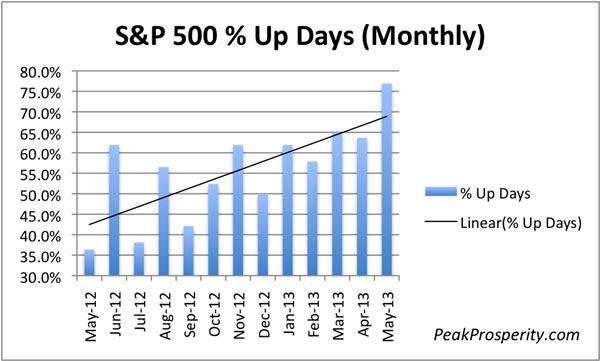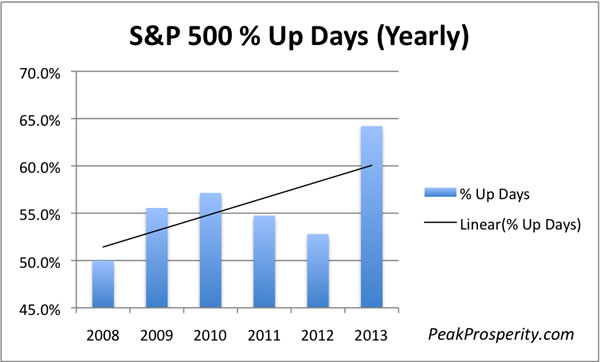I see all of this handwringing about a bubble being created in the stock market and I think its a good idea to calm people down.
Yes, it is true that the stock-market rally has been engineered by the central banks. It is specifically their policy to keep interest rates ultra-low to create a modest level of inflation 2-4% (to monetize the debt- i.e. pay the debt off with inflated currency) and to force the economy into taking greater risks. Yes, its true that trillions of dollars have been created out of thin air, but this is NOT as reckless as many pundits proclaim.
The worst possible scenario for the economy is deflation. You only need to ask the Japanese what that felt like over the past 20 years. Deflation is to the economy as a black hole is to light. The more pronounced it is the harder it is to get out of a deflationary trend. If the economy is collapsing and prices collapse along with it, then people have an even greater incentive NOT to spend. The policy of Quantitative Easing might seem reckless and counter-intuitive but its not. Its the only hope the world economy has of achivieving escape velocity and the economy spends its savings to generate a self perpetuating momentum.
The problem is that corporations have countered the economic crisis by cutting spending and investment, which has resulted in a jobless recovery. There is an estimated $3 Trillion in corporate savings sitting in bank account around the world. One of the objectives of the central banks is to force corporations to spend that money building plants and equipment to spur more employment.
Sadly, the people who this ends up hurting the most are the savers. Policy makers are not deranged sociopaths. Quite often, public policy will end up hurting one group of society at the expense of the other. In this case quantitative easing and low interest rates hurt society's savers. The problem is that the alternative of doing nothing is a hell of a lot worse.
As for the Stockmarket, its not outrageously overvalued. At this stage its "fairly valued" at around 16 Times earnings. Could the market correct by 10% or even 15%? Most certainly, this is the natural order of things. A clever analogy I once heard describing the stock market was like a pile of sand that was having more and more sand added to the pile. Inevitably, there are mini-avalances as the circumfrence of the sand grows wider and wider and the pile grows higher and higher.
So how does one play this rally that has taken the Stock market to record highs? Well if you''ve been fortunate enough to participate in the rally, it might be a good idea to take some money off the table. Pare back your stock holdings maybe 10-15% and wait for the stockmarket to cascade down to a stable level. I can't tell you when it will happen, but it WILL happen.
If you haven't participated in the rally, don't panic and buy into the market just yet. Wait until the market corrects at least 10% before buying back in. Then accumulate good companies.
Its still early days yet, and there is plenty of money to be made in the coming years. Eventually the world economy will stabalize and repair itself. And don't bleive the gloomsters out there. If the world economy doesn't repair itself then we are all in a heck of a lot of trouble, and it won't matter how much money you have (even $billioniars would suffer). Why? Because fundamentally its in everybody's self interest that the world economy repair itself. The Chineese, Brazilians, Russians, Greeks, Italians, African's, Americans all need each other to make the world go round.
As for the complaint that its the top 10% who own 81% of the stockmarket. Well, doesn't that tell you something? If the richest 10% own 81% of the stockmarket, maybe they understand something that you don't? That if you INVEST in great companies (as opposed to speculate) over the long term you will make better returns than if you just put your money into Government Treasuries- or Bank Accounts.
People who are fixed income investors, can invest in the market easily without "losing it all" by putting their hard earned money into some speculative crap. All they have to do (and all they should do) is to invest in an index fund like Vanguard's S&P 500 index fund. Then take a course in how to INVEST for the long term. The more you know, the more you will prosper as a saver or retiree.
Trust me it can be done. If I can do it anybody can.

